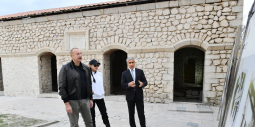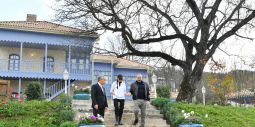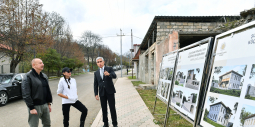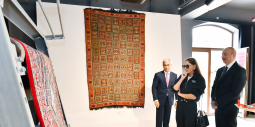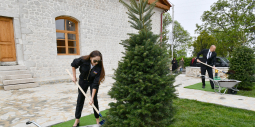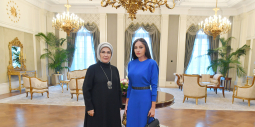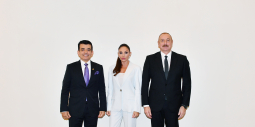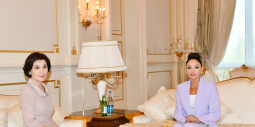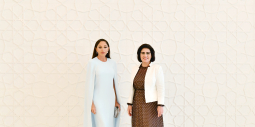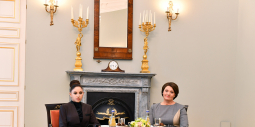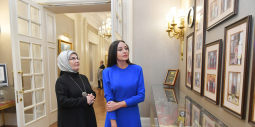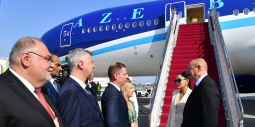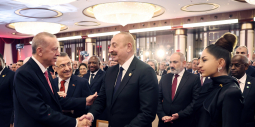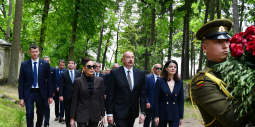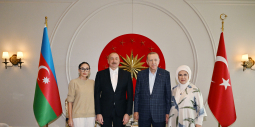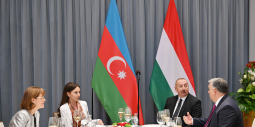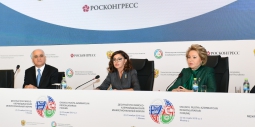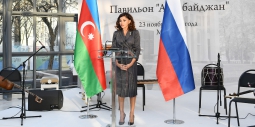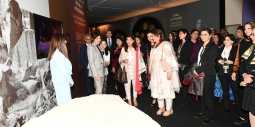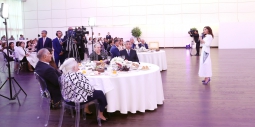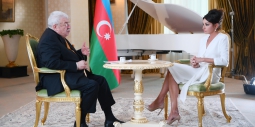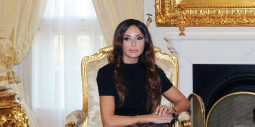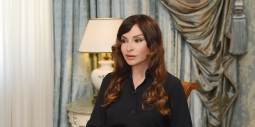Interview to the Business Year
08.05.2012Every Way That We Can
TBY talks to Mehriban Aliyeva, First Lady of Azerbaijan, on the Heydar Aliyev Foundation, economic growth, and the importance of charity work.
Correspondent: You are considered one of the most energetic first ladies in the world. You head the Heydar Aliyev Foundation, the Friends of Azerbaijani Culture Friends Foundation, Azerbaijan’s Gymnastics Federation, and you are also a member of the Azerbaijani National Assembly. What does such vigorous and multifaceted activity mean personally for you?
Mehriban Aliyeva: Success for success’ sake, power for power’s sake, and ambition have never been key motivations for me. The main thing is to be of help to people, and to find ways of helping those in need. And such help and support can be very diverse. Some need help to have their health brought back, to get education, or to establish a museum, while others need help to preserve architectural monuments for future generations. Sometimes there is a necessity to support the development of infrastructure, sometimes there is a need to provide organizational support for interesting projects, and what is really important to me is when we succeed in both realizing large-scale projects and helping real people.
Correspondent: The Heydar Aliyev Foundation was established in 2004. Since its establishment it has realized a wide range of cultural, educational, and healthcare projects. How would you assess the results of the Foundation’s work?
Mehriban Aliyeva: It’s quite difficult to classify our activity and the projects and programs we have implemented from major to minor ones. From the very beginning we set a range of priority directions in our work, such as education, healthcare, culture, sport, and the social sphere. For eight years the Heydar Aliyev Foundation has been successfully implementing large-scale projects in these spheres. We managed to build cooperation with influential international organizations and arrange high-profile international conferences and festivals in Baku. The Foundation continues its work to improve the education system and ensure its integration into the world education system, as well as help those who need care, preserve national and moral values, and draw the world community’s attention to Azerbaijani realities. There is such a concept as the “human dimension,” and our Foundation is working on this aspect. It is very hard to separate the tasks, to say that this is a matter of urgency, and this one can wait. For example, hundreds of schools, tens of kindergartens, and specialized boarding schools for children with special needs have been built, repaired, and equipped to the highest standards as part of the Foundation’s projects and programs. And this is not just fresh repair work on the building. Such state-of-the-art schools open brand new horizons, creating wider opportunities for students, which include tens of thousands of boys and girls every year. A Jewish education center was established, and a French school is going to open its doors to students at the initiative of the Foundation. I’m sure of the importance of this work, and this investment in the future can hardly be exaggerated. At the same time, our Foundation is carrying out great work in the field of health care. This includes hospitals and clinics, state-of-the-art equipment, and projects aimed at helping children with diabetes and thalassemia. Each of these projects means saved lives and recovered health. Supporting culture and preserving cultural legacy is another important priority in our Foundation’s activity. With the support of the Heydar Aliyev Foundation, Azerbaijan is hosting music festivals and a traditional international mugham festival, the Gabala international music festival, and a festival of classical music named after Rostropovich. The International Mugham Center was built in Baku, while new museums and musical schools have emerged in the regions. We are actively cooperating with many international organizations, including UNESCO, ISESCO, and UNICEF. However, the major result of our Foundation’s work is that we have managed—I hope—to revive the traditions of charity in Azerbaijan. In our country, these traditions have a long and rich history. Oil magnates from the era of the first oil boom, including Haji Zeynalabdin Tagiyev and Musa Nagiyev, made a tremendous contribution to the formation of these traditions. In the early 20th century Haji Zeynalabdin Tagiyev funded the construction of the first secular school for girls and the opening of the first national theater in Azerbaijan. He also funded the education of Azerbaijani youths in the best universities in Russia and Europe. Beautiful buildings constructed with the funds of Musa Nagiyev continue to be the architectural pearls of Baku. And it is good that these traditions are today revived in tolerant, secular Azerbaijan, which has an ancient history and is located on the crossroads of the East and the West, and where the past interweaves with the present.
Correspondent: The Heydar Aliyev Foundation is making a valuable contribution to preserving a rare cultural legacy not only in Azerbaijan, but also in other countries. For example, it has supported the restoration of the stained-glass windows in the Strasbourg Cathedral. How significant are such activities?
Mehriban Aliyeva: An ancient and rich cultural legacy is a source of national pride for our people. This includes carpet weaving, which dates back thousands of years, literature, and music, which offer a fascinating mix of East and West, as well as the architectural monuments of Azerbaijan, which earn the epithet “motionless history.” The Azerbaijani mugham, the Novruz holiday, the art of ashiqs, and carpet weaving were incorporated into the UNESCO Intangible Cultural Heritage List. And historical and cultural legacy requires constant and tireless care. Any lost artifact means irreplaceable losses and, I can say for sure, it is a crime against future generations, and so we are trying our best to preserve cultural legacy both in our country and beyond its borders to the maximum extent. The Heydar Aliyev Foundation has restored architectural monuments, such as the Palace of Versailles in Paris, which are included in the World Heritage List. We also allocated funds to restore the stained-glass windows of the 14th-century Strasbourg Cathedral, restore the Louvre, rebuild the Berlin City Palace, which was destroyed during World War II, as well as restore damaged medieval Azerbaijani manuscripts kept in the Vatican’s archives. The Foundation will continue working on this front. Currently, we are carrying out negotiations over the restoration of cultural monuments in the Vatican. Building cultural and humanitarian relations with other countries is of great importance to us. It is cultural and humanitarian cooperation that affects how well we know each other, and how familiar we are with the history, culture, and traditions of other people. In 2011, the Heydar Aliyev Foundation organized a large number of events in different countries on the occasion of the 20th anniversary of the restoration of Azerbaijan’s independence. We hope that these events have helped many people to familiarize themselves with and love our music, culture, and art. This January, the “Fly to Baku: Contemporary Art from Azerbaijan” exhibition took place in London with the assistance of the Heydar Aliyev Foundation. The exhibition featured interesting works in a variety of genres, including painting, graphics, photography, and video. Such exhibitions will be arranged in Berlin, New York, Paris, and Rome. I would like to emphasize that the Heydar Aliyev Foundation’s international activity is not limited to the field of culture. The Foundation built a girls’ school in Muzaffarabad in Pakistan after an earthquake destroyed the old school. We contributed to building and repairing schools in the Netherlands, Georgia, Egypt, the Russian Federation, and Romania. We provided financial assistance in tackling the consequences of the earthquake in Haiti and floods in Romania. I would like to note that the Heydar Aliyev Foundation will continue contributing to expanding Azerbaijan’s dialogue with other countries. This is a beautiful foundation for international cooperation.
Correspondent: Azerbaijan’s economy continues to rapidly develop amid the world economic crisis. How important is it to develop the traditions of charity in Azerbaijan?
Mehriban Aliyeva: Azerbaijan’s successes are obvious. The state budget increased 16 fold, and thousands of schools, hundreds of healthcare facilities, and tens of sports complexes have been built in the country. The level of poverty fell fivefold from 49% to 9%. Our beloved native Baku has changed, and changes have also occurred in Azerbaijan’s regions. This makes it possible to assess the scale and rate of the country’s development. Nevertheless, there is an enormous field of activity for non-commercial foundations. First of all, it is a cultural sphere. Today, Azerbaijan is recognized mostly as an exporter of oil and gas. However, our history and our culture is an important national heritage as well. There is also the necessity to support social projects, but the level of socio-economic development is not the point here. In my opinion, feelings and inner emotions are more important. As the economic crisis continues it is vital to form the traditions of charity and social responsibility, and instill the ability to sympathize and empathize into ourselves. This must become part of our life.
Correspondent: Less than a year ago Azerbaijan celebrated the victory of its duo Ell & Nikki at the Eurovision Song Contest in Düsseldorf. Since you head the Eurovision 2012 Organizing Committee, how is Azerbaijan gearing up to host such important event?
Mehriban Aliyeva: Probably it’s no exaggeration to say that our representatives’ victory at the Eurovision Song Contest was marked by nationwide celebrations. And as an Azerbaijani, and as a citizen of my country, I was truly thrilled with the triumph of the duo. This, surely, is a great success of both the participants of the contest and all those involved in preparing this winning performance. The victory at Eurovision is a good example that shows that success and responsibility walk together in life. Preparations for such a large-scaled contest include many aspects: a concert hall, hotels, city logistics, and infrastructure. Our preparations are already nearing an end, and I hope we will summarize the results of the last stage of preparation for Eurovision in April 2012. I would like to point out another aspect. Eurovision is a common feast of music from different countries, different people, and different cultures. In Azerbaijan, for centuries, representatives of various nationalities and religions have co-existed in peace and harmony. Being a country located at the crossroads of continents and civilizations, we are familiar with different religions and cultural values, customs, and traditions. Our traditions of tolerance provide a brilliant foundation so that all conditions are created for every visitor who comes to Azerbaijan as an organizer, observer, or just a member of the audience. I hope the beauty of Baku, which combines old buildings in eastern architectural styles and modern European-style buildings, will fully meet the requirements of even the most demanding guests with its delightful aura, cordiality, and hospitality. Tens of thousands of people from different countries will visit Baku for Eurovision 2012, and we are happy to give them all a proper reception.
The Business Year
Baku, Azerbaijan, 2012
http://thebusinessyear.com/publication/preview/azerbaijan-2012

